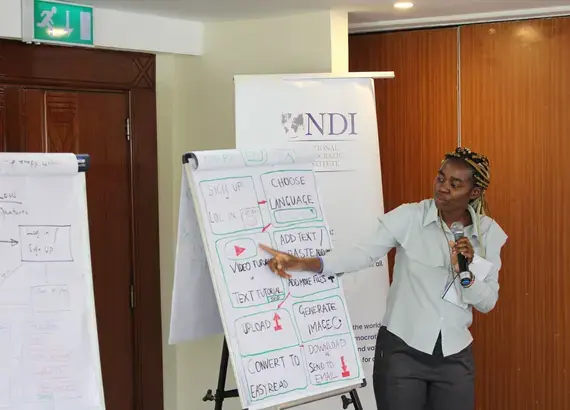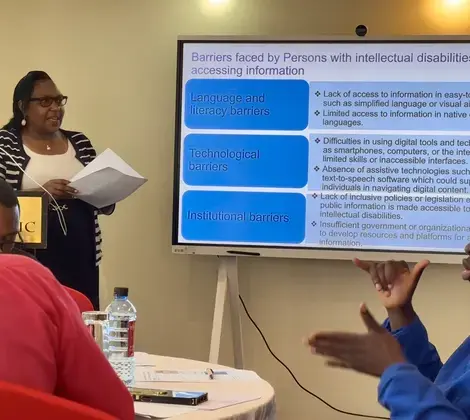
Participants develop a list of features they would like to be included in an Easy Read generator tool. They then used this list to design a prototype tool.
Success Story
Using AI to Strengthen Democratic Inclusion
From the 15 percent of people around the world who live with a disability, 8 in 10 reside in developing countries. Although Article 21 of the United Nations Convention on the Rights of Person with Disabilities (CRPD) grants them the right to accessible information, people with disabilities often face communication barriers due to a lack of information accessibility. Access to information is essential for democratic and political participation, which enables people to make informed decisions and influence policies that affect their lives. If people with intellectual disabilities have greater access to easy-to-read information on political processes or policies and the necessary assistance using it, they will be better equipped to advocate for themselves and participate in democracy. By reducing communication barriers through Easy Read and other accessible formats, societies can foster inclusion, making it possible for people with disabilities to engage fully in civic life.
With these circumstances in mind, the National Democratic Institute (NDI) organized a two-day workshop in Nairobi, Kenya, to bring people with intellectual disabilities, caretakers, civil society representatives, government officials, and accessibility experts together to test and design tools for creating Easy Read documents. The workshop began by reviewing the results of a remotely-conducted activity to test assumptions about how to best address barriers to accessible information in Kenya. Participants then explored the possibility of using generative AI tools, like ChatGPT, to facilitate the creation of accessible information. To ensure that everyone could participate, NDI provided accessibility accommodations, such as sign-language interpretation, an expanded time frame agenda to allow for ample participation, and illustrations to enhance comprehension and retention.
Easy Read is a method of presenting information in an easy-to-understand format. Easy Read materials are especially beneficial for people with disabilities, those with low literacy levels, non-native language speakers, and individuals experiencing memory difficulties. Easy Read combines short sentences that are clear and free of jargon with simple images to help explain the written content. Easy Read is essential not only for people with intellectual disabilities but also for making information accessible to everyone, particularly in a democratic society. Accessible information enables all citizens to participate in civic processes, make informed decisions, and understand their rights and responsibilities. By utilizing Easy Read, NDI seeks to support inclusive democratic participation and enable people to actively engage in their communities.

Twenty representatives from various disabled people’s organizations (DPOs) and other civic groups contributed their diverse perspectives and expertise to advance information accessibility in Kenya. These groups included the United Disabled Persons of Kenya (UDPK), the Kenya Association of the Intellectually Handicapped (KAIH), Kenya ICT Action Network (KICTANet), Differently Talented Society of Kenya (DTSK), Black Albinism (BI), Ubongo Kids, Down Syndrome Society of Kenya (DSSK), Kenya Sign Language Interpreters Association (KSLIA), the Kenya National Association of the Deaf (KNAD), and the Directorate of Social Development under the Ministry of Labour and Social Services. The event fostered collaboration and laid the foundation for further development of accessible digital tools in the country.
On the first day, participants reflected on the structural challenges that restrict access to information for people with intellectual disabilities. Alice Mundia, Chairperson of the Differently Talented Society of Kenya (DTSK), led a discussion on the barriers to creating and distributing Easy Read materials. Participants then explored NDI’s Easy Read website, provided feedback on navigation and usability, and used generative AI tools to draft Easy Read documents. Working in small groups, they refined these drafts, exploring the potential and challenges of using AI for accessible content creation.
“I wish I knew about this before. This will help a lot,” said a teacher who supports students with Down Syndrome. “I struggle to break down complex jargon into understandable information. With this tool, that work becomes easier.”
During the second day, participants focused on mapping key stakeholders involved in creating and disseminating Easy Read documents and developing a prototype for an Easy Read Generator tool. Participants collaborated to design user flows, interfaces, and features for the tool by sketching visual prototypes. This hands-on session ensured that the tool would meet the diverse needs of people with intellectual disabilities and their supporters. The concept for an Easy Read Generator originated during a pitch competition in 2021, where NDI staff proposed tech solutions to democracy challenges. The winning idea, the "Right To Know" project, envisioned an Easy Read translator, anticipating the development of generative AI technologies like ChatGPT, which has enabled computers to simplify complex documents quickly.
Through the workshop, participants found that while ChatGPT is a powerful tool for generating and simplifying text, the unpaid version has several limitations that hinder its generation of accessible content. These include browsing limitations and the inability to upload documents or generate images.
Following this workshop, NDI has begun exploring two avenues to address these limitations and improve access to accessible information for people with intellectual disabilities. First, NDI is reaching out to companies that provide Generative AI chatbots to explore the possibility of allowing NGOs that support people with intellectual disabilities to access paid services for free or at a reduced cost. Such a program could enable disability rights advocates, caregivers, and organizations to leverage the most advanced tools to generate Easy Read content. This would significantly enhance their ability to reach and support individuals who depend on these accessible materials.
NDI is also exploring avenues for developing the prototype Easy Read Generator that participants designed into a working application through future programs. This tool would not only improve the experience of using Generative AI tools to create Easy Read documents, it could also be offered for free to select partner organizations, eliminating cost as a barrier to generating easy-to-read information.
NDI’s engagement with this program is implemented with the support from the National Endowment for Democracy (NED) program.
